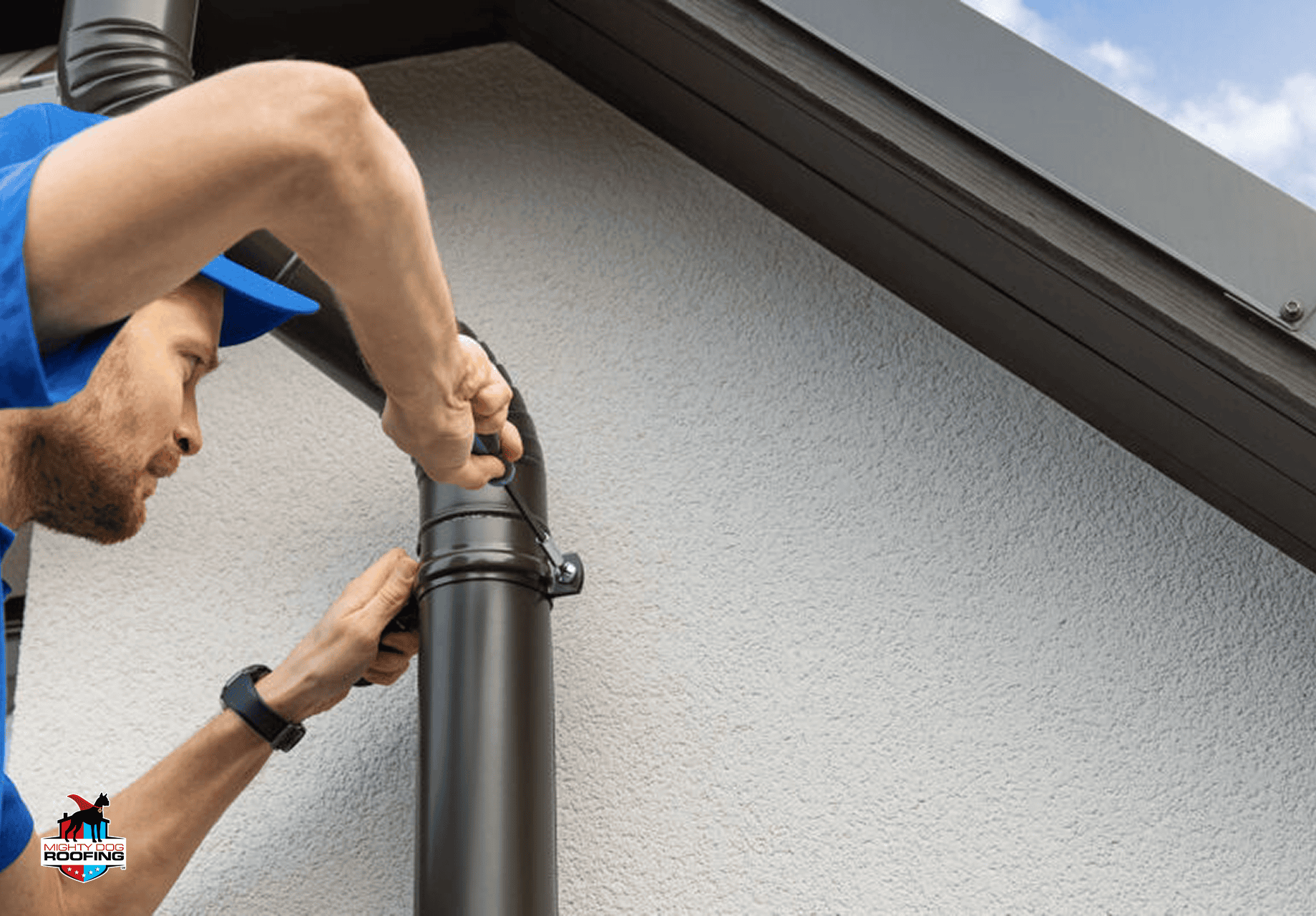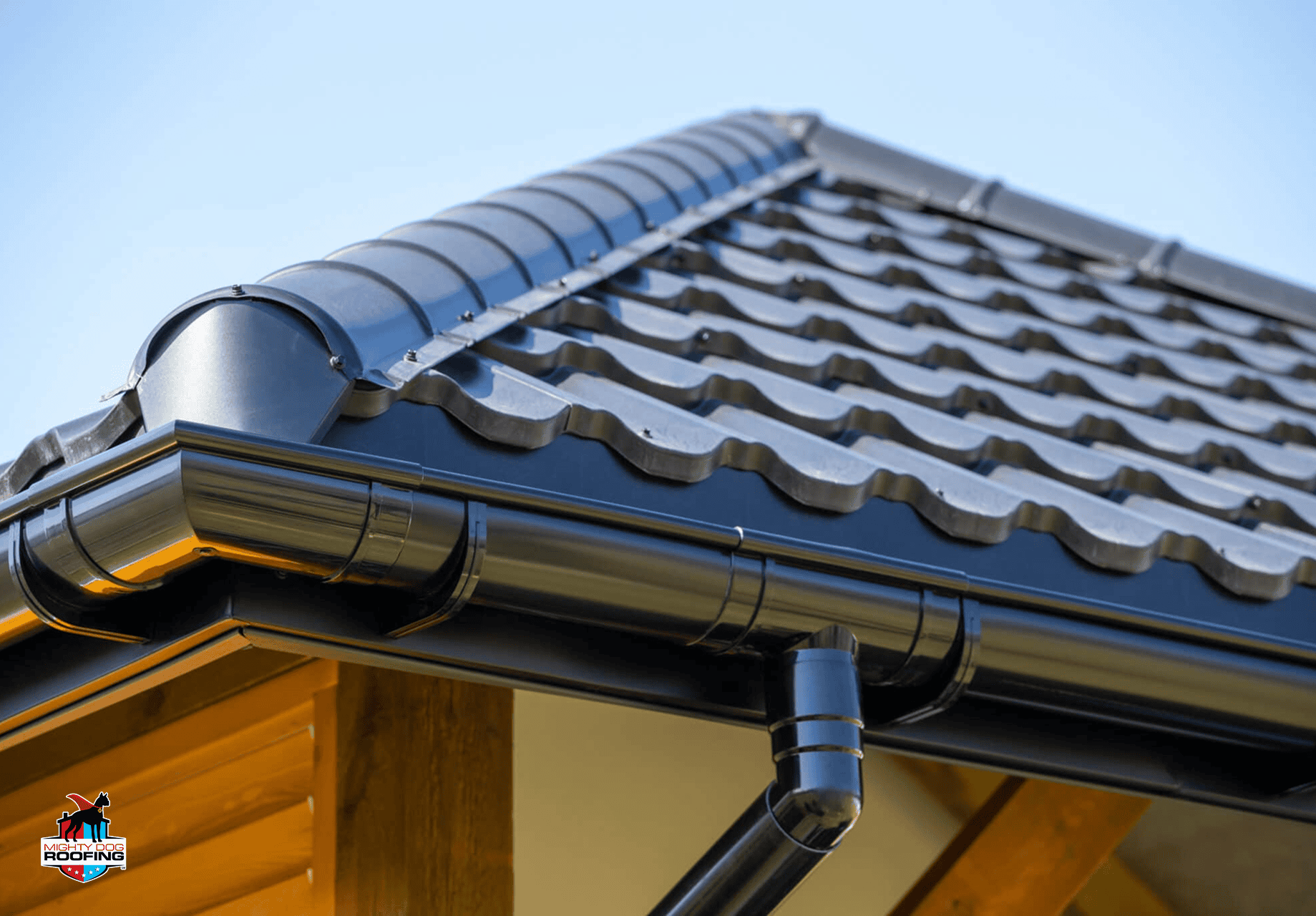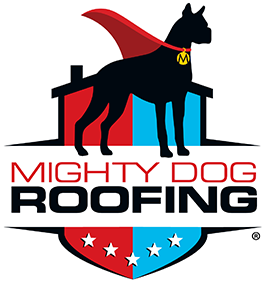At Mighty Dog Roofing, we understand that proper gutter installation in Glen Mills, PA is essential for protecting your home's foundation, siding, and landscape from water damage while enhancing its curb appeal. Our expert team has developed this comprehensive guide to help homeowners understand the critical aspects of quality gutter systems, from material selection and sizing to professional installation techniques and maintenance practices that will extend the lifespan of your investment and ensure optimal water management throughout Pennsylvania's challenging seasonal weather patterns.
Why Proper Gutter Systems Matter in Glen Mills
Glen Mills's 45 inches of annual rainfall creates serious challenges for homes without adequate gutter systems. The area's clay-heavy soil traps moisture against foundation walls, causing potential structural damage. Delaware County's freeze-thaw cycles compound this risk as water enters foundation cracks, expands when frozen, and turns minor issues into costly repairs. Additionally, Glen Mills's mature oak and maple trees shed debris that can overwhelm gutters, highlighting the need for robust water management systems that both handle heavy rainfall and resist clogging.
Homes built before 1960 in Glen Mills face extra vulnerability due to older construction methods with shallow foundations and porous masonry not designed for today's water management standards. The cost difference is striking—professional seamless gutter installation runs $1,500-$3,000, while foundation repairs start at $5,000 and often reach $15,000. Factor in $2,000-$4,000 for landscape restoration and up to $10,000 for moisture remediation, and quality gutters, downspouts, and proper rain drainage clearly represent the most cost-effective home protection investment for Glen Mills PA homeowners.

Types of Gutter Systems for Pennsylvania Homes
Selecting the ideal gutter system for your Glen Mills home requires careful consideration of material durability, capacity needs, and aesthetic compatibility with your property's architectural style. Pennsylvania's variable climate—with hot, humid summers and cold winters with frequent freeze-thaw cycles—demands materials that resist corrosion, handle thermal expansion, and maintain structural integrity under snow and ice loads. The average 45-inch annual rainfall in Glen Mills also necessitates properly sized gutters that can manage water volume during intense summer thunderstorms.
The three primary gutter materials each offer distinct advantages for Glen Mills homes. Aluminum provides excellent corrosion resistance and weighs approximately 1.5 pounds per foot, making it suitable for most residential applications without requiring additional structural support. Copper gutters, while premium-priced at 3-4 times the cost of aluminum, deliver unmatched longevity and develop a distinctive patina that enhances historic home aesthetics. Steel options balance strength and cost, with galvanized steel requiring more maintenance in our humid environment while stainless steel offers superior corrosion resistance at a higher price point.
Key Material and Style Considerations
- Weight Factors – Copper (approximately 2.8 pounds per foot) and steel (2-3 pounds per foot) require stronger fascia attachment than lightweight aluminum (1.5 pounds per foot), particularly important for older Glen Mills homes with potentially deteriorated fascia boards.
- Gauge Thickness – For aluminum, .027" thickness suits moderate conditions while .032" provides superior durability for homes under mature trees; copper typically uses 16oz (standard) or 20oz (premium) thickness; steel gauges range from 26 (lighter) to 24 (heavier-duty).
- Capacity Requirements – K-style 5-inch gutters handle approximately 5,520 gallons per hour, suitable for roof areas up to 2,500 square feet; 6-inch gutters manage 7,960 gallons per hour, recommended for larger roofs or steep pitches that accelerate water flow.
- Style Compatibility – Half-round gutters complement Tudor, Victorian, and Colonial Revival homes common in Glen Mills's historic districts; K-style offers 40% greater capacity and better suits Craftsman, Ranch, and contemporary designs prevalent in newer neighborhoods.
- Color and Finishing Options – Aluminum offers 25+ factory colors with baked-on enamel finishes; copper provides natural patination; steel comes in galvanized silver or can be powder-coated in custom colors to match existing architectural elements.
Your selection should ultimately balance these practical considerations with the specific needs of your property, including roof size, architectural style, tree coverage, and budget constraints. For Glen Mills homes with roof areas exceeding 2,500 square feet or those situated on steeply sloped lots that intensify water flow rates, upgrading to 6-inch K-style gutters provides valuable additional capacity during heavy downpours, potentially preventing overflow that could damage landscaping and foundations.
Seamless Gutters vs. Sectional Systems
Seamless gutters revolutionize water management for Glen Mills homes by eliminating joints—the primary failure point in traditional systems. Industry studies show that over 90% of gutter leaks occur at seams, making seamless systems significantly more reliable. Our on-site fabrication process uses digital measurements and specialized forming machines to create custom-length gutters from aluminum coil stock. This approach is ideal for Glen Mills's mature neighborhoods, where historic homes have settled unevenly and feature non-standard dimensions that sectional gutters cannot accommodate. Beyond functionality, seamless gutters offer superior aesthetics with clean, uninterrupted lines that enhance architectural details. For Glen Mills's historic properties, we customize profiles to match period-appropriate designs, providing expanded material options and over 20 standard colors plus custom matching.
Though seamless gutters cost 10-15% more initially ($6-$12 per foot versus $4-$8), their reduced maintenance and longer lifespan make them more economical over time. Seamless systems last 20+ years compared to sectional gutters' 7-10 years—a significant value difference. Maintenance requirements vary considerably: seamless systems need only periodic cleaning, while sectional gutters require regular joint inspections and resealing. For Pennsylvania homes, seamless gutters handle extreme temperature fluctuations far better than sectional alternatives. With fewer connection points, they experience less stress during expansion and contraction cycles throughout our seasonal shifts, maintaining structural integrity and watertight performance while sectional systems gradually separate at their vulnerable seams.
Proper Sizing and Placement
Professional gutter installation requires calculations DIY approaches miss. We size gutters using formulas based on roof square footage, pitch, and Glen Mills's rainfall intensity (3.5 inches/hour). Capacity differences matter—5-inch K-style gutters handle 5,520 gallons hourly versus 6-inch systems' 7,960 gallons, preventing overflow during downpours on larger, steeper roofs. Our technicians maintain the standard ¼-inch decline per 10 feet—too little causes standing water; too much creates overshooting. For Glen Mills's complex rooflines with water-concentrating valleys, we position gutters to capture runoff while allowing snow and ice to slide over rather than into gutters, preventing ice dams.
Common DIY errors include improper hanger spacing (correct: every 24-30 inches for snow loads), insufficient expansion allowance (crucial in Pennsylvania's climate), and fascia attachments missing structural lumber. Amateur installations neglect roof-edge relationships where gutters must align with drip edges to prevent water intrusion. Valleys need special attention as they triple water flow. For Glen Mills's historic homes with intricate rooflines, professional installation ensures proper downspout positioning, preventing storm bottlenecks. We also address fascia condition with custom brackets that maintain proper slope while securing attachment to load-bearing elements.
Downspout Considerations for Effective Water Management
Downspouts are vital for water management in Glen Mills's rainy climate. While industry standards suggest one downspout per 20-40 feet of gutter, Glen Mills's intense precipitation requires closer 20-foot spacing for effective drainage during thunderstorms. Size matters—2×3-inch downspouts handle 600 square feet of roof drainage, while 3×4-inch models manage 1,200 square feet. For Glen Mills's complex rooflines with multiple valleys concentrating water flow, larger downspouts provide essential capacity during heavy spring rains.
Discharge planning requires attention in Glen Mills's varied terrain, from flat areas to steep slopes affecting drainage. We extend downspouts 5-10 feet from foundations, with adjustments where slopes might direct water toward the structure. Glen Mills's clay-heavy soil, which absorbs water slowly, makes proper runoff direction crucial. Strategic planning uses your property's natural topography for effective water management that protects your home while maintaining landscape aesthetics.
Key Downspout Termination Options for Glen Mills Properties
- Underground Drainage Systems - Buried pipes directing water to sewers, rain gardens, or dry wells. Ideal for Glen Mills's historic properties where landscape aesthetics matter.
- Rain Barrels and Collection Systems - Capture systems conserving water for gardens while reducing runoff. Popular in Glen Mills's eco-conscious community and effective for moderate rainfall.
- Dispersal Systems - Specialized end pieces spreading water over wider areas, reducing erosion. Essential for Glen Mills's steeper properties where concentrated flow damages landscaping.
- Splash Blocks and Erosion Control - Concrete or plastic pads preventing soil erosion below downspouts. Recommended for all installations, often paired with river rock for better dispersal.
- Permeable Landscape Features - Strategic plantings and hardscape elements absorbing runoff naturally. Valuable in Glen Mills where municipal regulations emphasize stormwater management.
Winterization is critical in Glen Mills where freezing can compromise systems. We include freeze-resistant features for underground extensions with proper slopes and strategic access points. For ice-prone areas, we offer heated cable solutions. Effective downspout design also helps meet Glen Mills's stormwater regulations protecting Crum Creek and the Delaware River from sewer overflows.
Gutter Guards and Protection Systems
For Glen Mills's tree-lined areas, gutter protection systems reduce maintenance while preserving water flow. Micro-mesh guards filter fine debris—pine needles and maple seeds—while allowing water through during downpours. Their stainless construction withstands freeze-thaw cycles with minimal ice damming. Reverse curve systems use water tension around a curved hood—good for oak leaves but less effective for smaller debris. Installation under shingles needs expertise to maintain roof warranties. Foam inserts install easily but require replacement every 2-5 years in Pennsylvania's climate. For tree-heavy properties, micro-mesh performs best despite higher costs ($8-12/foot vs. $6-7 for reverse curve and $4-5 for foam), while open areas may suit cheaper reverse curve options.
Protection systems require maintenance despite "maintenance-free" marketing. Micro-mesh needs occasional surface cleaning but saves Glen Mills homeowners $150-300 twice yearly in gutter cleaning. Reverse curve systems need cleaning every 3-5 years where debris collects at downspouts. Foam inserts need most frequent attention as materials decompose. Systems typically include 10-25 year warranties, but verify compatibility with gutter warranties, as improper installation can void them. In Pennsylvania winters, micro-mesh performs best by draining meltwater while preventing ice dams. Properties with pine or oak trees require special attention due to sticky residue, making professional installation essential for Glen Mills's mature tree neighborhoods.

Professional Installation Process
Professional gutter installation starts with laser measurements to determine optimal pitch for your Glen Mills home. We repair fascia while removing existing gutters. Our seamless gutter machine creates custom lengths on-site from premium aluminum, preserving performance and appearance. We place brackets at 24-inch intervals for Glen Mills's snow loads using hidden hangers secured into structural components. Corners, endcaps, and outlets get our two-stage sealing: industrial sealant before fastening, then flexible coating that withstands Pennsylvania's temperature variations. Downspouts include expansion allowances with straps that accommodate building movement and seasonal changes, preventing common DIY failures.
Quality control guides our process with specialized equipment unavailable to DIY installers such as calibrated torque drivers ensuring proper fastening. Our machines produce smoother profiles than sectional systems, enhancing water flow and aesthetics. Professional sealants offer longer protection (15+ vs. 3-5 years for store products) in Glen Mills's freeze-thaw cycles. Final inspection includes water testing for slope, load testing for security, seam inspection for leaks, and downspout verification. The result: a water management system tailored to your Glen Mills home—protecting your investment through Pennsylvania weather while boosting property value.
Maintaining Your New Gutter System
Quality gutters require maintenance throughout Glen Mills's seasons. Proper care extends life and prevents foundation and exterior damage. Clean unprotected gutters quarterly in Glen Mills's treed areas, while gutter guards need attention once or twice yearly. Focus on debris, water flow, seals, and attachments. Monitor downspout outlets that clog even when gutters remain clear, and corner miters where leaks develop from expansion.
Different materials require specific care. Use non-abrasive tools on aluminum to protect coatings, and avoid metal tools on copper that damage patina. Micro-mesh guards need light brushing, while foam inserts need occasional rinsing. For DIY cleaning, ensure safety: use stable ladders (1:4 ratio), wear gloves, and consider ground-level tools. For two-story or complex-roofed homes, professional maintenance provides safety and thoroughness DIY methods cannot.
Seasonal Gutter Maintenance Calendar for Glen Mills Homes
Season | Maintenance Tasks | Frequency | Special Considerations |
Spring | Remove winter debris, check for loose fasteners, inspect seals, clear downspouts | Early April | Look for ice damage, clean pollen buildup, check for displaced brackets from winter freezing |
Summer | Light cleaning, check downspout discharge areas, inspect for water stains on fascia | June | Monitor for moss/algae growth in shaded areas, check for DIY-safe repairs |
Fall | Regular cleaning during leaf drop, ensure downspouts flow freely, check for sagging | October/November (every 2-4 weeks) | More frequent for homes with oak/maple trees, check seams for leaks during rain |
Winter | Pre-snow inspection, monitor for ice dams, check for secure attachment | Early December | Clean before first heavy snow, ensure downspout extensions are properly positioned |
Watch for warning signs needing attention: water marks on fascia, shingle granules in gutters, sagging between hangers, peeling paint or rust, plants in gutters, or water pooling near foundations. Quick action prevents major damage. Mighty Dog Roofing offers maintenance programs for Glen Mills properties.
Our service ensures your water management system protects your home year-round with inspections, cleaning, repairs, and condition documentation—providing peace of mind without DIY hazards. Call us today at 610-801-1462 to learn more about our maintenance plans and schedule your initial inspection. Let Mighty Dog Roofing give you one less thing to worry about as a homeowner. Your roof will thank you!


